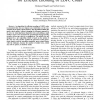Free Online Productivity Tools
i2Speak
i2Symbol
i2OCR
iTex2Img
iWeb2Print
iWeb2Shot
i2Type
iPdf2Split
iPdf2Merge
i2Bopomofo
i2Arabic
i2Style
i2Image
i2PDF
iLatex2Rtf
Sci2ools
114
click to vote
ICC
2007
IEEE
2007
IEEE
Systematic Modification of Parity-Check Matrices for Efficient Encoding of LDPC Codes
An algorithm for efficient encoding of LDPC codes is presented that does not impose any restrictions on the construction of the parity-check matrices. The algorithm modifies the parity check matrix, without changing the subspace spanned by its rows, by removing linear dependent rows and adding a small number of new rows such that the graph-based message-passing encoder will not get stuck in a stopping set. The added rows are designed by a new algorithm which is based on the notion of the "key set". The encoder exploits the sparseness of the paritycheck matrix, and the encoding complexity grows almost linear with the blocksize, because the number of added rows, which may not be sparse, is relatively small.
Added Rows | Communications | Graph-based Message-passing Encoder | ICC 2007 | Linear Dependent Rows |
| Added | 16 Aug 2010 |
| Updated | 16 Aug 2010 |
| Type | Conference |
| Year | 2007 |
| Where | ICC |
| Authors | Mohamed Shaqfeh, Norbert Görtz |
Comments (0)

